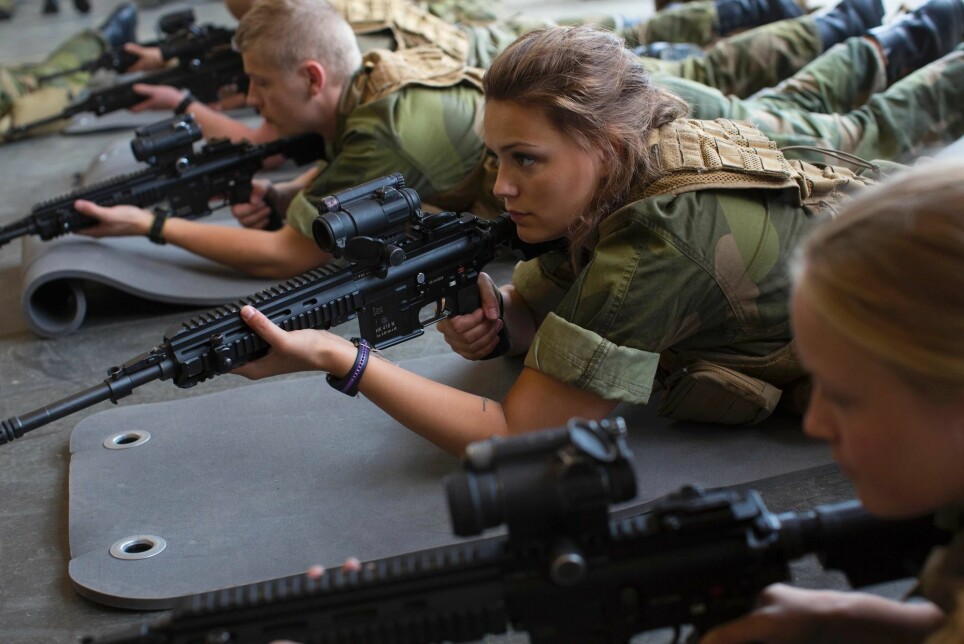
Researchers conducted a gender equality experiment on 500 recruits
Do men become more open to gender equality by sharing dormitories and tasks with women in the military?
As of 1 January 2015, all 17-year-olds in Norway, regardless of gender, are subject to the country’s mandatory military draft.
In 2020, 33 per cent of all draftees in Norway were female.
Mandatory military service for women is quite unusual from a global perspective. Only a few other countries, such as Israel, North Korea and Malaysia, have general military service for both sexes.
A research group has now conducted an experiment using Norway and Norwegian recruits.
They wanted to know how male soldiers feel about serving with women.
What attitudes do they have towards gender and equality?
And how does that affect their well-being and motivation during military service?
Random distribution
The study was conducted on Norwegian recruits from Brigade North.
The researchers received permission from the Armed Forces to make a random distribution of 500 recruits. These were divided into 153 groups.
Fifty-seven of the groups had a mix of genders, with two female and four male soldiers. The rest of the groups consisted only of men.
For eight weeks, these groups, each with six people, executed exercises together. In addition, they shared a dormitory.
Attitudes before, during and after
On the first day of boot camp, also known as basic training, the soldiers all had to answer a questionnaire.
This consisted of around 100 questions, designed to measure both military attitudes and attitudes towards gender and equality.
Among other things, the researchers asked the soldiers if they thought it would affect the effectiveness of the Armed Forces if a group consisted of both men and women.
They also asked what the soldiers thought about the distribution of housework between the sexes.
After boot camp, the soldiers had to answer exactly the same questions.
The survey was also conducted six months after boot camp was over and the experiment had ended.
Wanted to test known theory
One social psychology theory states that prejudices in a dominant group can be changed for the better if the group is exposed to members of a minority group.
It was this theory that the researchers wanted to test, says Dan-Olof Rooth in a press release from Stockholm University.
He is a professor of economics at the Institute for Social Research at the university.
Rooth conducted the study with researchers Andreas Kotsadam at the Frisch Centre in Oslo and Gordon B Dahl at the University of California, San Diego.
How did it go?
So what actually happened with the recruits?
Did the men who served and lived in close quarters with women for eight weeks change their attitudes toward gender and equality?
Yes, they did. The male soldiers who were in a mixed-gender group had far more positive attitudes after boot camp than those who had only been with men.
“The differences between the groups were clear,” said Andreas Kotsadam, the Norwegian researcher in the study.
They changed their attitudes towards both gender-segregated groups in the armed forces and towards gender equality in general.
No change in the long run
Six months after the end of the experiment, however, attitudes had changed again. Now the soldiers were back to where they were on the first day of boot camp.
There was no longer a difference in attitudes between the soldiers who had only been with men and those who had worked and lived with women.
Does this mean that the researchers were able to disprove the theory that prejudices change if people are exposed to those they are prejudiced against?
Kotsadam believes the study shows that it is useful to work together to influence attitudes.
“But an intensive period of eight weeks is clearly not enough for the attitudes to last,” he says.
Did they make different choices?
In addition to conducting the surveys, the researchers went further. They wanted to know what the young men were doing after their military service.
They were interested to know whether the men who had had intense close contact with women for eight weeks chose other educations and professions. Were they more open to occupations where there are more women?
Here again, the researchers found no difference between those who had gone through boot camp in close quarters with women and those who did not.
“What we’ve learned from the study is that if we don’t keep up the exposure over time, then changes in attitude won’t last,” Kotsadam said.
More research needed
The results from the study actually raise as many questions as they answer, Kotsadam said.
“We can’t say that the changed attitudes would have lasted if men and women had worked and lived close together for much longer,” he said.
The research team hopes that they can have the opportunity to conduct additional studies.
Now they are working together with the Norwegian Defence Research Establishment on new studies with the Navy and Air Force in Madla.
Will the men lose their "military feeling"?
There have been concerns raised in some countries that women in the military will destroy men's esprit de corps and "military feeling", and that men will consequently be less motivated to serve, Kotsadam says.
However, there is no evidence of this in this study.
The men who were in groups with both sexes were as satisfied with their initial service as those who had not.
Working and living closely with women did not affect their performance either, he says.
The researchers also gained access to data on how the soldiers have performed during their service, such as whether or not they have been promoted, for example.
“We also found no difference between the men who have been ‘exposed’ to women and those who have not,” he said.
Will gender disappear?
Nina Rones, a researcher at the Norwegian Defence Research Establishment, said in 2017 that she is sceptical of the research that has been done on mixed-gender rooms in the Armed Forces.
The results from the Norwegian studies are startling, she believes.
"Gender disappears when people share a room," one of the researchers told NRK.
“Is this really possible?” Rones said.
Found gender-segregated tasks
For her doctorate, Rones studied the Norwegian officers' school for a whole year. Here she saw that the tasks were very gendered.
Girls took care of sanitary equipment and the "inside maintenance " while boys took care of machines and vehicles.
Everyone was better at what they could do before their service began, and traditional gender roles were strengthened.
“In mixed-gender rooms, the female and male soldiers also fell straight into stereotypes,” she said.
Followed a squad
When she later followed a female-only squad, however, she saw that the women got better at traditional male tasks when they were alone.
In this case, there were no males to take over the tasks or to overrule them.
Rones believes that small studies of soldiers in mixed-gender rooms have been inflated and generalized.
“Results from individual studies are established as a universal truth. And they form the basis of politics, without having been examined closely and criticized,” she said.
Translated by Nancy Bazilchuk
Read the Norwegian version of this article on forskning.no.
Source:
Gordon B Dahl, Andreas Kotsadam and Dan-Olof Rooth: Does Integration Change Gender Attitudes? The Effect of Randomly Assigning Women to Traditionally Male Teams, The Quarterly Journal of Economics, Volume 136, Issue 2, May 2021, Pages 987–1030, December 2020































